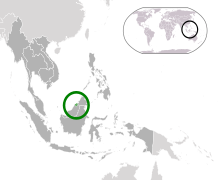
Brunei Darussalam is a country and sovereign state located on the north coast of the island of Borneo in Southeast Asia. Apart from its coastline with the South China Sea, the country is surrounded by the state of Sarawak, Malaysia. The remainder of Borneo, and its geographically largest part is Kalimantan, part of Indonesia.
Economic growth during the 1990s and 2000s, with its gross domestic product (GDP) increasing 56% from 1999 to 2008, transformed Brunei into an industrialised country. It has developed wealth from extensive petroleum and natural gas fields. Brunei has the second-highest Human Development Index (HDI) among the Southeast Asian nations, after Singapore, and is classified as a 'developed country' by the United Nations.[1] According to the International Monetary Fund (IMF), Brunei is ranked fifth in the world by gross domestic product per capita at purchasing power parity. The IMF estimated, in 2011, that Brunei was one of two countries (the other being Libya) with a public debt at 0% of the national GDP. In 2012, Forbes also ranks Brunei as the fifth-richest nation out of 182, based on its petroleum and natural gas fields.[2]
With the recent weakening of the country's economy due to pressure on oil prices, Brunei has adopted hardline sharia law to try to gain local public support.[3] In 2019, the country issued a new law making gay sex and adultery punishable by stoning to death, even for foreigners or non-Muslims,[4] leading to a boycott of Brunei-related businesses primarily targeting hotels owned by the Sultan of Brunei and Royal Brunei Airlines.[5][6]
- ^ "Human Development Reports". HDR.UNDP.org. United Nations. Archived from the original on 11 October 2009. Retrieved 5 October 2009.
- ^ Too, Debbie (25 February 2012). "Forbes ranks Brunei fifth richest nation". TheJakartaPost.com. Bandar Seri Begawan, Brunei Darussalam: The Jakarta Post, PT Bina Media Tenggara. The Asia News Network (The Brunei Times). Archived from the original on 26 February 2012.
- ^ "Brunei sultan seeks conservative support with hardline sharia laws". TheJakartaPost.com. Bandar Seri Begawan, Brunei Darussalam: The Jakarta Post, PT. Niskala Media Tenggara. Agence France-Presse. 2 April 2019. Archived from the original on 3 April 2019. Retrieved 6 April 2019.
- ^ Tan, Yvette (3 April 2019). "Brunei implements stoning to death under anti-LGBT laws – Brunei is introducing strict new Islamic laws that make anal sex and adultery offences punishable by stoning to death". BBC.co.uk. BBC News. Retrieved 27 June 2023.
- ^ Dixon, Emily (5 April 2019). "More companies boycott Brunei over anti-gay laws". CNN.com. London, England: Cable News Network. Retrieved 27 June 2023.
- ^ Liang, Annabelle (3 April 2019). "Brunei's controversial new shariah laws are now in effect". TheDiplomat.com. The Diplomat. Associated Press. Retrieved 27 June 2023.